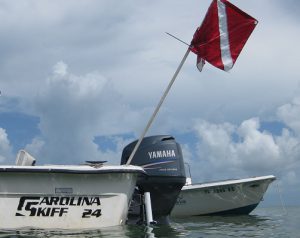In March 2022, the Florida Fish and Wildlife Conservation Commission (FWC) announced Florida has reached the threshold of 1 million registered recreational boats! If you add in the number of commercial boats for charters, flats guides, trap fishers, and pleasure cruises, that equals tons and tons of boats out on the water! Everyone needs a driver’s license to drive a car legally, but unbelievably, there is very little required to operate a boat in Florida – or even rent one! In 2020, Monroe County ranked #1 for the number of boating accidents, followed by Miami-Dade County. Of course, we have hundreds of miles of coastline and we can boat year around; however, knowing how to safely operate a boat and having the necessary safety equipment can prevent accidents and save lives.
or even rent one! In 2020, Monroe County ranked #1 for the number of boating accidents, followed by Miami-Dade County. Of course, we have hundreds of miles of coastline and we can boat year around; however, knowing how to safely operate a boat and having the necessary safety equipment can prevent accidents and save lives.
Boater Safety Courses
Luckily, the US Coast Guard Auxiliary and Key West Power Squadron offer in-person classes regularly. There are also free online FWC-approved boating courses and you can take the boating course at home, at your own pace. Anyone born in 1988 or after is required to take a boater safety course and have a boat safety ID card – if you are under 34 years of age, you need to take a boater safety course to legally operate a powerboat over 10 horsepower.
When you own a boat, you know there is a lot of required safety equipment, and it is a good idea to make everything is up to date and in good working order. When spending the day on a friend’s boat, ask if they have the required safety equipment. Boat safety is a priority and a visit from law enforcement can result in pricey fines.
While on the water on your kayaks and SUPs, you need to have a life jacket and a noise-making device on-board. Place a whistle on your personal flotation device and that will suffice. Between dusk and dawn, a flashlight or headlamp must be on to alert other boaters of your location. Keep in mind boats do not have brakes, so avoid loitering in navigation channels. Boats need time to stop and navigation channels in the Florida Keys are very narrow, typically with seagrasses and shallow water on both sides.
- Flares expire every 42 months (~3.5 years). Make sure yours are not expired. Three unexpired flares are required on boats 16 feet and over in length. You can keep the old expired flares onboard, but they do not count toward the required 3 unexpired flares! Monroe County Sheriffs’ office will accept expired flares. Do not dispose of in household waste since they are a fire hazard.
- 1 life jacket per person and 1 throwable flotation device per boat.
- Kids under 6 should wear a USCG-approved life jacket at all times, and are required to while the boat is underway in any boat under 26 feet in length.
- Kayaks and stand up paddle boards – must have life jacket, whistle, and a flashlight/headlamp turned on between dusk and dawn.
- Boats over 26 feet need to have a fire extinguisher.
- Bow riding is not recommended since it is very, very dangerous
- Boaters must maintain a distance of at least 300 feet from divers-down flags on open waters — that is the distance of a football field!! and at least 100 feet from flags on rivers, inlets or navigation channels.
- Boaters must slow down their speed around snorkelers, divers and swimmers.
- A diver down flag is required from a vessel when there are snorkelers or divers in the water.
- When snorkeling or diving independent of a vessel, a diving buoy can be used.
Even if you are not required to take a boater safety course, it is a good idea and can be completed usually in less than 3 hours online.
The Institute of Food and Agricultural Sciences (IFAS) is an Equal Opportunity Institution authorized to provide research, educational information, and other services only to individuals and institutions that function with non-discrimination with respect to race, creed, color, religion, age, disability, sex, sexual orientation, marital status, national origin, political opinions, or affiliations. U.S. Department of Agriculture, Cooperative Extension Service, University of Florida, IFAS, Florida A&M University Cooperative Extension Program, and Boards of County Commissioners Cooperating.
 0
0
